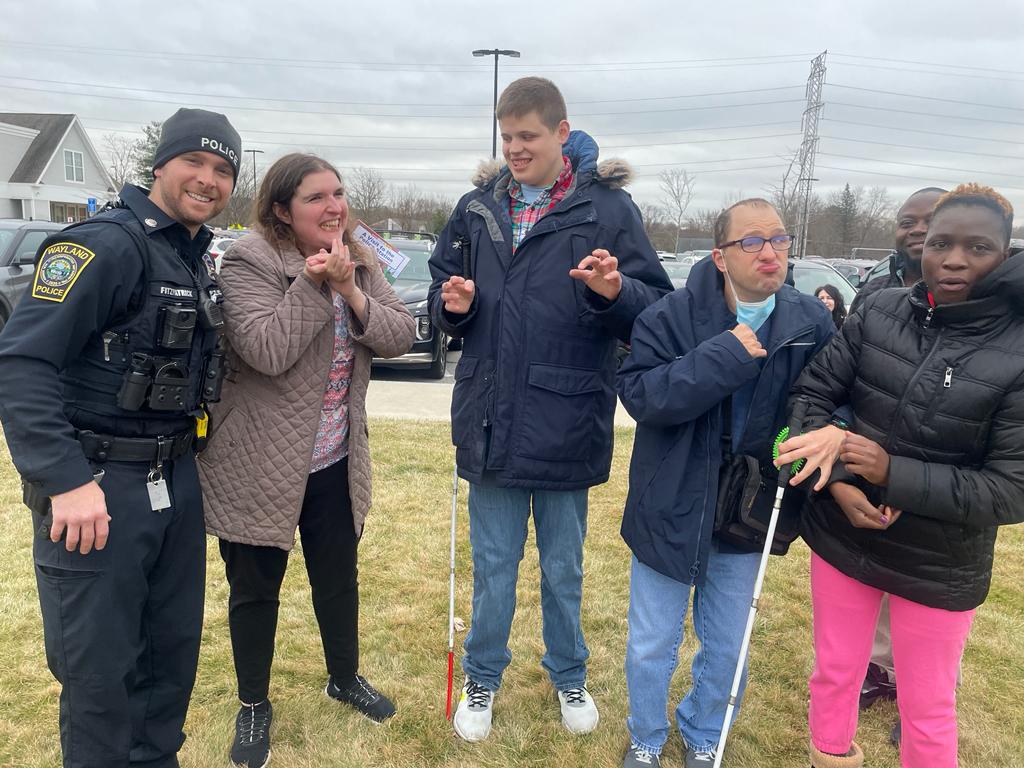Eric* is an adult resident at The Guild who enjoys going out into the community independently. While he is able to do this up to three times a week now, it took careful planning and consideration between him and house staff to get there. Eric was frustrated when he could not go out on his own and began destroying property at the house. The Guild staff collaborated with him and DDS workers to create a plan for Eric to set specific goals and work towards earning independent trips. With plans, routines, and rules in place, Eric knows what actions he can take to get the results he wants.
House Manager Sarah Ndugga says, “Eric’s preferences—such as his love for solo outings and his tendency to avoid crowded events—are central to every aspect of his planning. His team takes the time to understand his likes, dislikes, goals, and boundaries. His choices are not just respected—they are the foundation of how his day is shaped.”
But that doesn’t mean everything goes according to plan. The bus often runs late, the pool he frequents is sometimes closed, the vending machine he likes to get a snack from is broken every now and then. Many times, problems arise that are out of Eric’s and The Guild’s control. These instances can lead to dysregulation, escalated behaviors in public, and sometimes encounters with law enforcement.
Although it comes with risks at times, Eric has the right to decide when and where he goes in his community, just as everyone has the right to make their own choices. This reality is the balance of dignity of risk. According to the Mental Health and Developmental Disabilities National Training Center, dignity of risk is “being able to make choices that could have negative consequences and getting to experience those consequences.” Staff, families, and individuals work together to assess the risks of a given situation and decide on the best approach so that everyone can work towards their goals, do activities they enjoy, and engage with their community.
Supporting staff to do their best work
First and foremost, employees at The Guild “buy into” the concept of dignity of risk. Every day is an opportunity to support individuals to pursue their goals of community inclusion. To prepare for the challenges that can arise, The Guild has focused on building robust supports for the residential staff that are with individuals when challenging behaviors occur.
Staff at Eric’s house break down the planning process for community support into four key pillars:
- Person-centered planning: This is about putting the individual at the center of their support. It’s essential to listen to what they want and help them achieve their goals. For example, if someone prefers going out alone instead of with a large group, that preference will shape their support plan. Respecting their choices makes them more engaged in their own lives.
- Structured routine with flexibility: Having a predictable daily routine can reduce anxiety and create a sense of security. Knowing what to expect helps individuals feel more in control. However, it’s also important to allow for flexibility in the schedule. Adjusting plans when needed helps maintain stability while allowing the freedom to try new things.
- Advance preparation: Understanding an individual’s fears and preferences allows for better participation in community activities. For those who get anxious in group settings, giving advance notice about events can make a big difference. This helps them feel prepared and more willing to take part, boosting their confidence.
- Proactive staff training: Independence can be risky, so having a strong support system is crucial. Well-trained staff can identify triggers and handle situations calmly. When individuals know their caregivers understand them and can respond effectively, they feel safer. This sense of security encourages them to explore and take risks.
These four pillars work together to truly empower individuals. With a focus on what matters to them, supportive routines, preparation for new experiences, and trained staff, we can help individuals thrive and embrace their independence.
Every individual has the right to choose their activities and interests, and The Guild prepares staff for the challenges that come with each scenario. Whether that’s the stress of time management at their job site, navigating changing interpersonal dynamics at the spring dance, or being prepared for New England’s constantly changing weather on a hike with Waypoint Adventure, staff need to be able to anticipate the challenges and frustrations that could lead to escalating behaviors for the individuals they support.
As part of proactive staff training, all staff are trained and regularly re-trained in crisis prevention intervention, verbal de-escalation, and safe physical restraint. They also have access to educational materials to help educate the general public, contact information for non-emergency alternatives, specific guidelines for when they should call the police, and tips for interacting with law enforcement.
“Having cards or simple scripts ready for support staff to hand out during tough moments takes the pressure off. They do not have to come up with the right words on the spot or worry about how people around them are reacting. Instead, they can stay focused on the person they’re supporting, knowing the message is being shared clearly and calmly,” says Allison Traub, Clinical Director of Adult Services.
The Guild’s top priority for our staff is preventative measures. The best way to navigate challenging situations is to make sure there are always enough staff at the residences and that they have sufficient training and resources.
Fostering relationships with law enforcement
In each town where The Guild has a residence, staff have taken proactive steps to foster positive relationships with law enforcement by visiting the police stations, inviting personnel to visit the houses and attend events, and sending information to help them get to know the residents and their specific needs.
The Guild also has an internal resource manual on each city’s police department, providing quick access to key personnel, past interactions, and notes. This allows staff to connect to the right resources in the town, through the police department, the fire station, or the non-emergency line. The resource manuals have detailed notes on the management and clinicians on staff in the town and interactions between Guild staff or individuals with law enforcement and government officials. The Guild is able to continue the relationship-building process across different shifts and as personnel change over time.
The Guild takes great care to make and maintain connections with local law enforcement, but it can’t encompass everywhere individuals go and every jurisdiction they will interact with. The house managers and staff plan fun and exciting community activities within and beyond the town lines of where The Guild residences are located. While it has become more common for first responders to receive training specific to interacting with individuals with autism and other intellectual disabilities, there needs to be an ongoing conversation. Individuals shouldn’t be limited by geography just because it’s where they are known to law enforcement.
Being part of a community means having the freedom to explore, connect, and belong. By investing in training and collaboration, The Guild is working towards an environment where individuals with intellectual and developmental disabilities are safe and included in their communities.
*A pseudonym is used in this article to protect privacy


